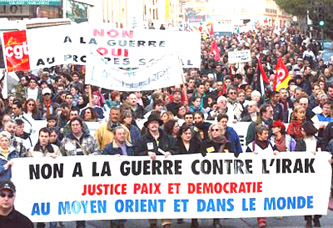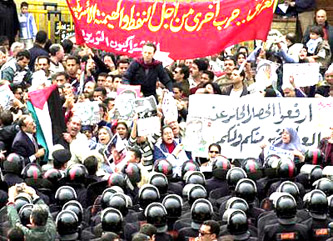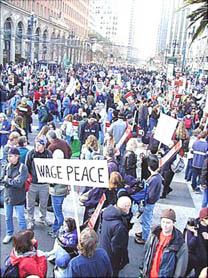As the US and its allies press ahead with their preparations for an armed invasion of Iraq, the peoples of the world have continued to express their opposition to these moves.
 The
growing anti-war sentiment of the American people was manifested on 18 January,
2003, as hundreds of thousand of people marched in Washington D.C clearly saying
"No to War!" Some estimates put the number of protesters at half-a-million
and much bigger than the massive 26 October 2002 anti-war demonstration in the
U.S.
The
growing anti-war sentiment of the American people was manifested on 18 January,
2003, as hundreds of thousand of people marched in Washington D.C clearly saying
"No to War!" Some estimates put the number of protesters at half-a-million
and much bigger than the massive 26 October 2002 anti-war demonstration in the
U.S.
Anti-war rallies were
also held in other cities throughout the U.S and Canada, Europe and Latin America
as well as Asia on 15 January-from Tokyo to San Francisco -- creating one of
the strongest shows of force to date by millions of people around the world
against the U.S. government's plan to attack Iraq. The Iraq Peace Action Coalition
(IPAC) had scheduled more demonstrations for end-January and February, across
the U.S.
In Turkey, human rights activists demonstrated in Incirik town outside the NATO base (used for enforcing a no-fly zone in northern Iraq).
The "Stop the War
Coalition" in Britain was stepping up the momentum of its anti-war rallies.
The British Prime Minister was heckled at his own Party function while anti-war
demonstrators forced him to make a side entry into the hall. In the tiny island
of Bahrain, known as a US ally in the Arab world, 2,000 protesters marched against
the war. Protesters burned the U.S flag in Sao Paulo, capital of Brazil. Massive
protests took place in Brazil during the World Social Forum meet in that country
earlier this month.
 A
survey, conducted with CBS News, found 63% of Americans saying they wanted the
Bush administration to find a diplomatic solution to the crisis, and only 31%
favouring military action. Public opinion across Europe was resolutely against
an invasion of Iraq. In a recent poll, 77 percent of the French voted against
a U.S-led offensive against Iraq.
A
survey, conducted with CBS News, found 63% of Americans saying they wanted the
Bush administration to find a diplomatic solution to the crisis, and only 31%
favouring military action. Public opinion across Europe was resolutely against
an invasion of Iraq. In a recent poll, 77 percent of the French voted against
a U.S-led offensive against Iraq.
The results of the poll in Britain on the issue showed that opposition to a war had risen steadily from 37% in October to 47% now. Over the same period, support for military action has fallen from a peak of 42% to only 30% now. Time (one of the top US imperialist weekly) magazine's online European edition asked its readers who they thought was the biggest threat-giving them three choices: Iraq, North Korea, and the United States. By January 16, with over 200,000 responding to this informal vote, over 81.8 percent had said, "The United States." A recent Gallup poll found that 53 percent of South Koreans viewed the United States unfavourably.
Even the opinion polls
of the imperialists are frevealing the anti-US and anti-war sentiment. The people
of the United States, as much as people abroad, are questioning America's self
assumed right to dictate how other countries should manage their affairs. As
a US Vietnam War veteran, speaking on behalf of hundred others, asked, "
Who is the U.S. to tell the Iraqi people how to run their country?"
U.S imperialism's aggression
and attempts to browbeat the world's people and governments in the name of safeguarding
democracy is increasingly being exposed for what it really is-a marauding, rapacious,
imperialist power out to secure the world domination and plunder through any
and every means. 
Huge regions of Qatar,
Bahrain, and Kuwait, bordering on Saudi Arabia and Iraq have been taken over
by the U.S. forces. The U.S. Navy has set up a major base in the Djibouti in
the Horn of Africa to control the Red Sea and threaten Yemen, Somalia, and the
Sudan as well as provide refueling facilities for the expedition against Iraq.
New U.S. bases have sprung up across central Asia and the Caucasus in the former
Soviet Central Asian Republics. The U.S. forces and army personnel are involved
in active combat against anti-government forces in some countries like Philippines,
or in joint military exercise, as in India and Nepal.
Jordan has declared that
it will not allow the use of its air space and territory for launching of a
military attack on Iraq. Iraq's key neighbours-Syria, Iran, Saudi Arabia, Jordan
and Egypt met to decide to discourage the U.S. from taking unilateral military
action. The European Union Commissioner for External Relations expressed the
EU's insistence on a specific U.N. mandate for the aggression on Iraq.
The isolation of the U.S. was further evident with two of the great powers,
France and Germany, declaring their opposition to the U.S led aggression on
Iraq. On 22 January, both these countries sent an unequivocal message to the
U.S. to this effect. France declared that it was willing to use its veto power
in the Security Council on this issue if the U.S. insisted on pushing ahead
with its war plans.